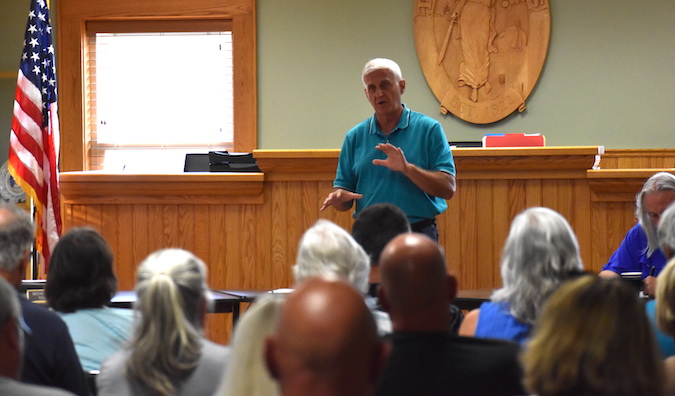Yates officials begin conversation on how to regulate short-term rentals
LYNDONVILLE – Town of Yates officials expect the town’s law on short-term rentals will be updated, but officials aren’t sure the best way to regulate the sites, which have become increasingly popular through Airbnb and Vrbo.
The Town Board held a two-hour public meeting on Monday evening that was attended by about 40 people. Town Supervisor Jim Simon said it was the beginning of a conversation on how to best balance the desires of people who rent out the sites with the concerns of some of the neighbors who worry about noise, late-night parties and a general uneasiness about changing faces next door.
“We’re trying to inform ourselves to make the nest decision possible,” Simon said.
Two towns in Orleans County recently passed laws regulating short-term rentals. Clarendon is largely keeping a hands-off approach, welcoming the sites and the visitors, Simon said.
The Town of Kendall passed a law in February bans any new short-term rentals in the waterfront districts, excluding bed and breakfasts which require a separate special use permit. Existing STRs are grandfathered in and allowed to continue.
Kendall officials said the waterfront districts have houses closer together on private one-lane roads. The STRs are presenting “parking and traffic impacts,” town officials wrote in the new law.
Kendall also is charging $500 every two years for short-term rentals to register in the town.
Simon said Yates has about a dozen STRs available in the summer through Airbnb and Vrbo, but he said the number of short-term rentals is likely higher.
Yates officials have heard few complaints from residents over the years about the sites. But Simon and board members said they foresee more out-of-town investors buying property in Yates, especially by the lake, to rent out.
Town Board members John Riggi and Harold Suhr said other lakefront communities have seen house prices skyrocket due to investors buying the sites for short-term rental income.
“People are buying up lakefront property,” Riggi said. “My nightmare is having a lakeshore full of property managers.”
In some communities investors are pricing local people out of the market who want to buy lakefront homes as primary residences. Riggi said the STRs as investments have transformed many communities around the state, making it too expensive for locals to buy homes.
But how to keep that from happening in Yates? Board members said they don’t want to see the character of the community changed, and the lakefront becoming exorbitant.
Three STR owners spoke at the meeting and said they keep close tabs on who they rent the sites to, and the revenue is needed to pay the taxes and also improve the properties.
Tom Arlington of Akron owns a cottage on the lake and has been renting it out since 2007. He provides information to the guests about many local businesses and urges them to patronize the community.
Arlington said he would support “a reasonable STR law” but doesn’t want the town going overboard, making too many regulations and imposing higher costs on the sites.
Another STR owner said the owners screen their guests and are responsive to any concerns from neighbors. She said the town could impose fines on STR operators who violate regulations for noise, or too many people and vehicles at the sites. She doesn’t want to see more fees and rules for operators who are already running good operations, and bringing visitors and tourism money into the community.
Paul Lauricella, chairman of the Orleans County Conservative Party and a candidate for the Town Board, urged the town officials to just leave the current law alone, and not impose more regulations on short-term rentals.
“This has been going on for 30 years,” Lauricella said about cottages and homes being rented out. “You (should) do nothing. You’re just going to stir up a hornet’s nest.”
Simon said the town needs to update its law for short-term rentals. That should begin with a definition of what a short-term rental is, he said.
The current town law defines a transient resident as someone staying for up to 30 days.
“The old law doesn’t suffice in today’s day and age,” Simon responded to Lauricella.
The town isn’t aware of all the sites that are rented out in Yates. Simon noted the town requires special use permits for other businesses that operate from homes, but hasn’t been doing that for short-term rentals even though they are functioning as revenue-generating enterprises.
Ken DeRoller, a former county legislator from Kendall, said the issue is a difficult one to regulate to meet the needs of the property owners looking to make some money and also balance the needs of neighbors and the community.
DeRoller would like to see the three lakeshore towns in the county – Carlton, Kendall and Yates – work together and establish consistent regulations for STRs.
One resident urged the town to try to rein in the sites, which can pop up without a neighbor or the town being aware of it.
“We didn’t buy our home to have a motel next to us,” she said.





































































